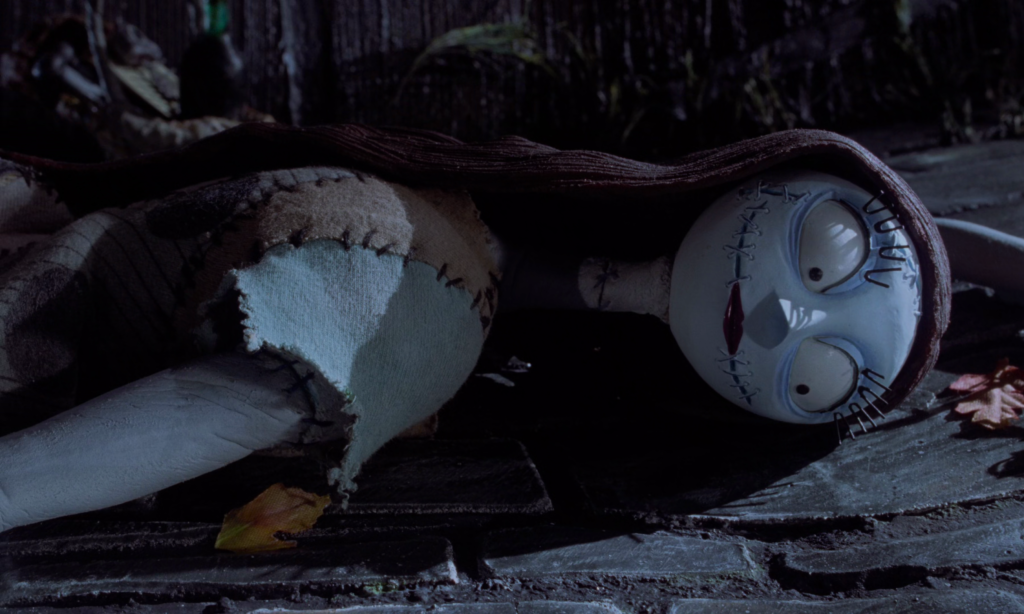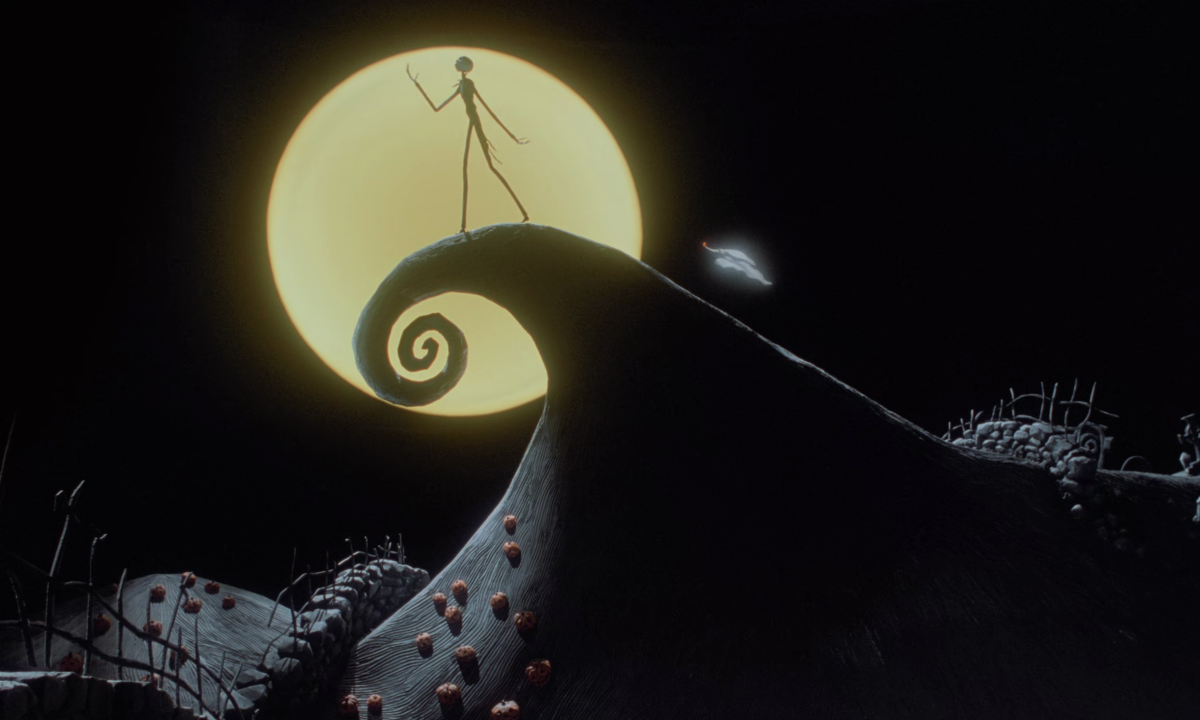Forgive me, Mr. Claus. I'm afraid I've made a terrible mess of your holiday.
The Nightmare Before Christmas is the ultimate melancholy holiday vibes movie, and frankly one of cinema’s great vibes movies, period. It’s a perfect film to immerse yourself into its mood: The film’s opening 20 minutes, in particular, set a terrific high mark in conjuring an atmosphere of spooky allure as we meet Halloween Town and its emo icon Jack Skellington who dares to dream of Christmas joy.
Director Henry Selick displays a mastery of stop-motion animation in his breakout film. He breathes so much life into this eerie tale, taking an aesthetic defined by producer Tim Burton and exploding it into a visual carnival. The film is stuffed to bursting with spooky creatures and baroque imagery. And it all makes terrific use of the perfect medium for such a story. The inherent rigidity and uncanniness of stop-motion animation is a perfect vessel for spooky shenanigans, simultaneously lifelike and otherworldly.

In addition to Burton and Selick, the film has a third key creative voice: Danny Elfman. Elfman not only provides the singing voice for Jack Skellington, but he’s the composer for the film’s score, including lyrics. The Nightmare Before Christmas is essentially a cantata, a miniature, introspective opera. Elfman’s score blends holiday spirit and existential angst, forming the backbone of the film’s emotional landscape. Whereas most animated musicals of the time were built around Broadway-style show-stopping numbers, The Nightmare Before Christmas is almost entirely sung through, making the whole film feel even more sui generis. Elfman’s music is every bit the creative achievement and expressive force that film’s visual artistry is.
It looks great and sounds great, but there’s a major corpse in the ointment: the script. The story has about enough meat on the bones for an hourlong-with-commercials TV special, meaning it feels padded even at a 71 minute runtime. The story is based off of a poem written by Burton, and Elfman wrote the score and lyrics based on this poem. Early in production, screenwriter Caroline Thompson was brought in to give the story more heft on top of Elfman’s score. Her big contribution to the story was Sally, who is the most layered and intriguing character. But it’s not hard to see the lumpy storytelling in action: the characters and segments often don’t feel as part of a whole. This is a byproduct of the story’s iterative development: Thompson’s script added some scenes and characters onto Elfman’s score, who in turn built on a much more straightforward poem by Burton.

We see this, for example, in villain Oogie Boogie, has almost no purpose in the story except to look cool and sing a catchy number. Take him out and almost nothing about the story changes — Lock, Shock, and Barrel have still abducted Santa to stop Christmas. (Incidentally, Oogie Boogie has come under scrutiny in the subsequent years, including by Thompson, for invoking some racist undertones.)
As much as its bumpy story, the film’s thematic content loses some potency in its final execution. Burton originally wrote Jack’s longing to be a more generic winter depression and holiday ennui; at the end of the prototype version of the story, he’s back where he started with just a sprinkle of Christmas cheer to make it to the next day and next year. This vision of the story, as depicted in the initial poem, has a clear and direct arc, and I like it a lot: it’s simple and evocative and universal, like Charlie Brown Christmas. But when writing the music, Elfman repurposed Jack’s angst into creative malaise and a desire to expand his own horizons, meaning Jack’s return to Halloween Town at the end of the story feels like an outright failure of his ambitions rather than a meaningful self-acceptance. So the moral is… stay in your lane and don’t try new things? Never dream for more?

That’s why I classify The Nightmare Before Christmas as a vibes movie above all else, and few are better at setting an unforgettable mood. As inventive as the world and scenario are, it doesn’t stand up to too much digging beneath the surface. Better to let it wash over you, which is certainly easy to do given the constant flow of great music and animation.
Is It Good?
Exceptionally Good (7/8)
Dan is the founder and head critic of The Goods. Follow Dan on Letterboxd. Join the Discord for updates and discussion.


3 replies on “The Nightmare Before Christmas (1993)”
Every time I see Nightmare Before Christmas, I bounce between “oh man, this is great, I remember why I loved this when I was eleven” and “this looks cool, but it’s boring and I hate sung-through musicals as a form.” I’m presently due for the latter on the next rewatch. 🙁
It’s certainly a thin story so I don’t blame some boredom and wish you well on a rewatch. But this is the first I’m learning of you hating sung-through musicals, and I think of you as “the musicals guy.” Why the disdain for the form?
I think, and this is very much a me thing, that it tends to flatten the effect and sort of bleed out the “actual” songs. Likewise, the interstitial stuff can’t, almost by definition, be exciting musically. It just results in a smeary experience for me.
It may not help that I’m a “musical guy” as a fan of dance more than music, which is why I have no problem, e.g., watching a full ballet which will likewise have music all the time. And, anyway, I guess it’s more like a deep suspicion born out of only a few data points, and I’m not set in stone about it.